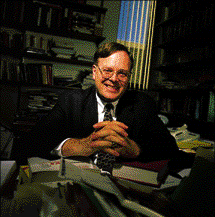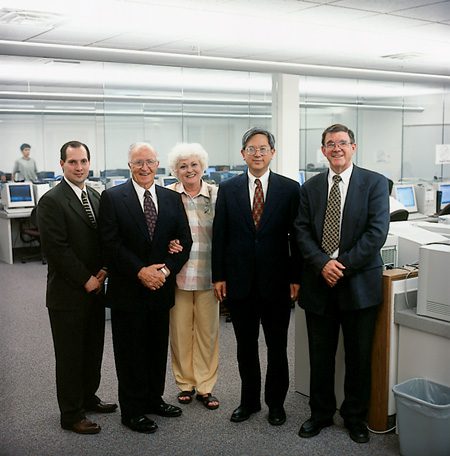
Known for his scholarship, leadership, and goodness, law professor Cole Durham works to promote religious liberty in the United States and abroad.
By Mary Lynn Bahr
He doesn’t look like he lives a life of international adventure. Tall, soft-spoken, wearing a dark suit and wire-rimmed glasses, he could be a prototype of the American professional. He is articulate but not imposing, pleasant but not charismatic. You might not at first find him compelling. But inside that mild-mannered exterior lives one of the most storied and story-worthy characters on campus: W. Cole Durham Jr., law professor.
Durham is a law school legend. He is also one of the world’s leading authorities on church-state relations and religious freedom.
“Cole is a unique combination of academic scholarship, familiarity with issues of religious liberty in foreign countries, and acquaintance with the governmental officials that influence religious liberty,” says BYU law professor Frederick M. Gedicks. “I’m certain there’s no one else in the country who can combine all three of those things.”
Durham’s work in support of religious liberty spans the globe. Several years ago he was active in resolving a potential threat to religious liberty in Utah. He defended the Religious Freedom Restoration Act (RFRA) in the United States, and he recently organized a team that is helping to draft new religious freedom laws for Peru. Since the Berlin Wall came down, he has been heavily involved in promoting legal reform and shaping religious freedom policies throughout eastern Europe.
“Cole’s work is monumental,” says law school dean H. Reese Hansen. “I think when the history of the Church is written about this period of time, he will be recognized as one of the really influential people who worked effectively and quietly behind the scenes for the benefit of the kingdom.”
Durham does work quietly. Some law students never realize there is an international celebrity on the fourth floor. But Durham’s closest colleagues speak of him with a respect that borders on awe.
“I was at a conference in Ecuador,” says law professor Kevin J. Worthen, “and when people found out I was from BYU they’d say, ‘Do you know Cole Durham?’ They’d met him at some conference and they remembered him, in part because he’s obviously very bright, but I think it’s more a remembering of his goodness.”
Other colleagues have had similar experiences. After working with him on several projects, emeritus law professor Eugene B. Jacobs concluded that Durham had friends everywhere. “So one day I was on a plane, flying from Chicago to Salt Lake,” Jacobs says. “The fellow next to me was not a Mormon, not from Utah. We got talking about the idea that the Mormon community is very close-knit. I said, ‘Watch, I’ll demonstrate this.’ I tapped a lady on the shoulder and asked her if she knew Cole Durham. She said, ‘Yeah, he’s my first cousin.’ People think I made it up, but this just happened.”
“I’ve called high-ranking officials in Romania and Russia and Spain and Germany, people from way up high in the Church, people from way up high in the political sphere,” says Scott Ellsworth, a graduate of BYU’s law school and Durham’s former research assistant. “They all know Cole Durham. Everybody knows Cole Durham.”
His office is legendary. Some professors go there instead of to the library when they need a book. A librarian once joked that Durham had the second-largest collection of library materials on campus. When a coveted office opens up at the law school, he is the only professor prohibited from applying for a change of location. At times his office has been so full that the door wouldn’t close.
“A standard joke is that Cole Durham drips pages,” Ellsworth says. “The first year students do a faculty roast, and without exception whoever is doing the parody of Cole Durham will stand up with a handful of notebooks and drip papers up to the podium because he carries all that stuff around. I don’t know why–he has it all inside his head anyway. The things this man carries in his head you can hardly find in a library.”
Durham’s intelligence is as notorious as his office. He can write a brilliant paper while flying to the conference at which he must present it. He leads his classes into theoretical discussions that leave some students far behind. Philosophical questions occupy him deeply. “He’s one of those people who may appear befuddled,” Gedicks says. “And then when you get up from the table you realize he has your wallet.”
“There isn’t anybody like Cole Durham in the world any more,” says Ellsworth. “During the Renaissance there were people that knew all the knowledge there was. Since the Renaissance, that hasn’t been possible–until Cole was born.”
The son of a Salt Lake City lawyer, Durham grew up with an affinity for philosophy, law, and religion. His interest in eastern Europe began with his LDS mission to Germany. Later, while a student at Harvard Law School, he studied German church-state relations. Since coming to BYU in 1976, he has regularly taught courses in advanced constitutional law. During the 1980s he was active in U.S. law and religion matters, and he established himself as a prolific, dedicated scholar of comparative law and issues related to law and religion. He was prepared to play a key role in the legal revolution that followed the collapse of communism in Europe.
“In October 1989 I was elected as the secretary of the American Society of Comparative Law,” he explains. “Two or three weeks later the wall came down in Berlin, and this incredible revolution began to occur. By about February it was clear that there was going to be a tremendous amount of legal change. Seeing that coming, I decided to make a trip through eastern Europe.”
The trip brought Durham an invitation to teach in Hungary during the spring of 1991. “This for me was a remarkable experience,” he says. “I had been teaching students whose primary worries were what was their job going to be, what would their starting salary be, and so forth. And all of the sudden I found myself with legal students whose questions were, ‘How do we remake our world?’ This had a major impact on me.”
Since then he too has been engaged in remaking the world.
“He has dedicated himself to this area and established himself by his own efforts,” says William F. Atkin, associate general counsel for the LDS Church and a long-time colleague of Durham. “Nobody assigned him this area of academic focus. I think he has prayerfully sought out what he could do to bless the kingdom, and he’s doing it.”
The academic connections made on that first trip to Hungary brought Durham into the circle of decision makers who have shaped legal reform, particularly church-state relations, in many eastern European nations. “For me as a scholar the doors were opened,” he says. He has spent seven of the last eight springs in Budapest teaching young lawyers from all over central Europe. As a leader of the International Academy for Freedom of Religion and Belief, and through other venues, he has consulted with scholars and government leaders around the world.
In the mid-1990s he helped direct a series of conferences in Russia and Ukraine which brought leaders together to consider religious freedom issues in the aftermath of communism. In 1997 he was the primary writer of two documents relating to the restrictive religious freedom law that passed in Russia. Both documents circulated widely, and Durham believes they had an impact on the final version of that law.
“I don’t begin to think that we will see exact copies of U.S. law in other countries,” he says. “That’s not what it means for religious liberty to be a true principle. What is true is that we need to have means for respecting free agency in this most central of all areas: how people see and understand their religious life, how they respond to the call of conscience.”
Durham actively fosters ongoing dialogue about religious freedom. Every October he organizes an international conference at BYU on church-state relations and religious liberty. The 1998 conference was attended by scholars and officials from 15 nations, including Kazakhstan, Kenya, Portugal, Peru, Russia, Romania, and Ukraine.
“Religious liberty is a true principle,” he affirms. “People of good faith recognize that. It is persuasive. It is just. And there’s a tremendous value in working to make that a common heritage for mankind.”
Durham is equally prominent in religious freedom efforts in the United States. He frequently consults with church and government leaders, and he has testified before Congress several times. One of his most important recent projects has been the defense of the RFRA, for which he led a team that drafted a friend-of-the-court brief on behalf of the LDS Church. The brief documents a pattern of discrimination against smaller, less-popular religious groups in land-use zoning cases; such evidence increases the likelihood that the Supreme Court will permit Congress to enact legislation to combat religious discrimination.
Durham’s own words sum up the conviction that drives him: “Watching the events in eastern Europe has sensitized me to how much individuals with commitment and ideas and competence can do to change the world,” he says.
That kind of commitment is as evident in Durham’s private life as in his efforts to shape world policy. As a campus bishop, he once stayed up all night memorizing the names and faces of the students in his ward. He cherishes the desk and the memory of his late father. He and his wife Louise have four children, and he is a dedicated father. He is kind without exception.
“Cole really is what the university ought to be,” Worthen says, “the kind of person of whom people outside the university say, ‘I didn’t know somebody could be so good at what they do and yet be so good as a person.’ Somewhere in the scriptures it talks about being as wise as serpents and as harmless as doves. That’s Cole Durham.”








